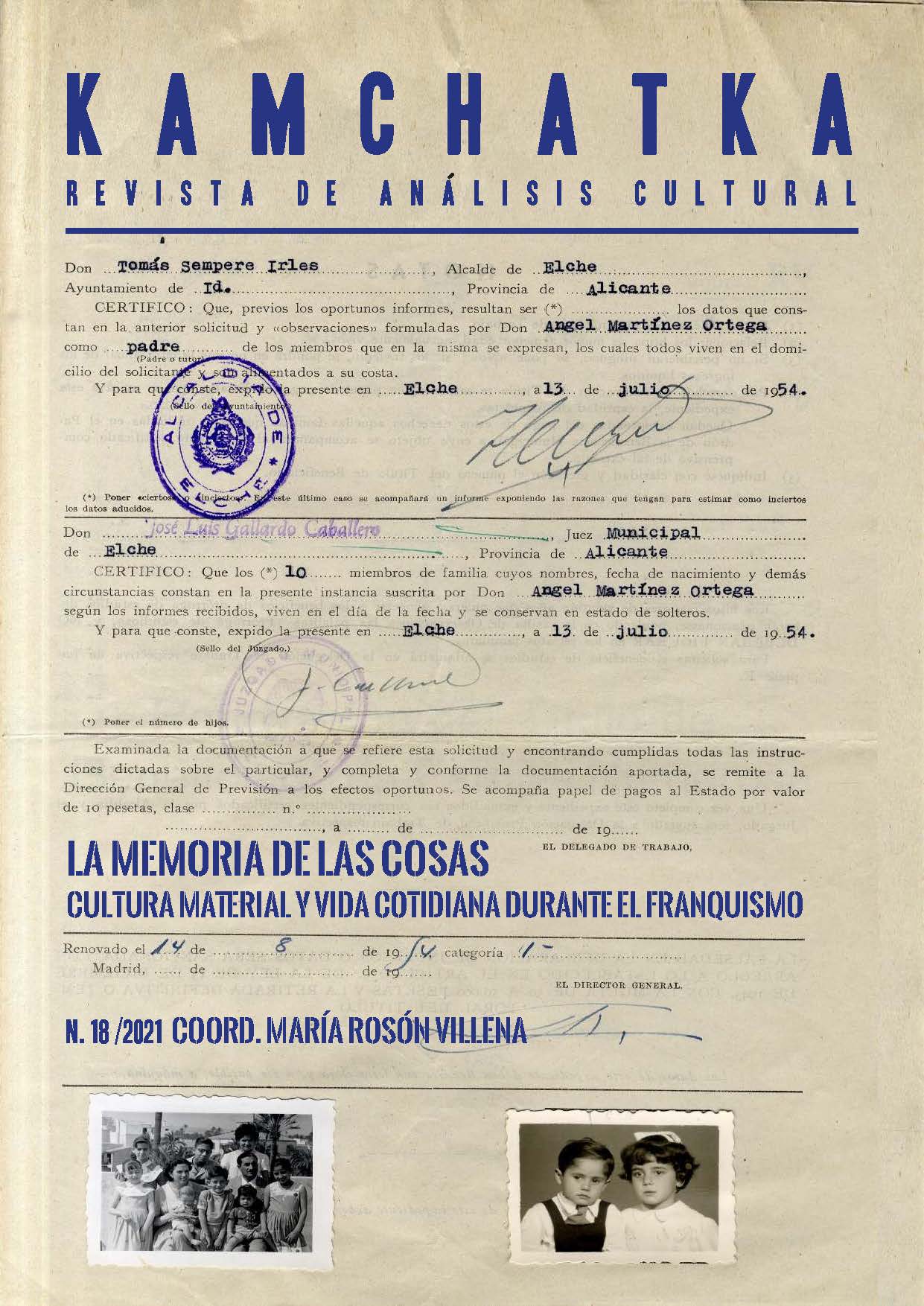Animal Diplomacy in De ganados y de hombres and Entierre a sus muertos by Ana Paula Maia: towards an Ethics of Consideration
DOI:
https://doi.org/10.7203/KAM.18.20678Keywords:
Ana Paula Maia, diplomacia animal, necrocapitalismo, ética de la consideración, post-humanismo Abstract
Abstract
This article aims to read the novels De ganados y de hombres (2013) and Entierre a sus muertos (2018), by Ana Paula Maia, based on the concept of animal diplomacy elaborated by Baptiste Morizot. The French philosopher, in Les diplomates (2016), defines animal diplomacy as a new paradigm of relationships between biotic communities, which must be understood in their political nature. The Brazilian writer chooses, in these two novels, to give an account of Edgar Wilson job performance, first as an abattoir stunner and then as the person in charge of removing animal carcasses from a rural highway. Wilson is the agent of an animal diplomacy, in the porous frontier between animals and humans, between a necrocapitalism and an ethics of consideration. After a theorical journey through animal studies form the post-humanist perspective, it will be analyzed, in the works, how Wilson tries to figure the agent of an animal diplomacy, which is inscribed between sacrifice and redemption, in an exploited and abandoned territory.
 Downloads
Downloads
 References
References
Agamben, Giorgio (1999). Homo Sacer I: el poder soberano y la nuda vida. Valencia: Pretextos.
Appadurai, Arjun (2015). El futuro como hecho cultural. Ensayos sobre la condición global. Buenos aires: FCE.
Bazterrica, Agustina (2018). Cadáver exquisito. Barcelona: Alfaguara.
Bolaño, Roberto (2004). 2666. Barcelona: Anagrama.
Braidotti, Rosi (2013). The Posthuman. Cambridge/Malden: Polity Press.
Butler, Judith (2009). Frames of War. When Is Life Grievable? London: Verso.
Colombetti, Florencia y Guiggia, Agustina (2020). “‘¿Quién es la bestia?’: una relectura del vínculo humano/animal a partir de la literatura de Ana Paula Maia”. Patiño, Roaxana; Calomarde, Nancy; Vaggione, Alicia (eds.). Actas X Encuentro Interdisciplinario de Ciencias Sociales y Humanas. Las urgencias del presente: desafíos para las Ciencias Sociales y Humanas. Tomo 2. Córdoba: Universidad Nacional de Córdoba: 45-53.
Cudworth, Erika y Hobden, Stephen (eds.) (2018). The Emancipatory Project of Posthumanism. Oxon/New York: Routledge.
Danowski, Déborah y Viveiros de Castro, Eduardo (2019). ¿Hay un mundo por venir? Ensayo sobre los miedos y los fines. Buenos Aires: Caja Negra.
De Mauro Rucovsky, Martín. “La vaca que nos mira: vida precaria y ficción”. Revista Chilena de Literatura N°97 (2018): 175-197 http://bit.ly/3actINI
Derrida, Jacques (2006). L’animal que donc je suis. Paris : Galilée.
Giorgi, Gabriel (2014). Formas comunes: animalidad, cultura, biopolítica. Buenos Aires: Eterna Cadencia.
Haraway, Donna J. (2008). When Species Meet. Minneapolis: Minnesota UP.
Maia, Ana Paula (2009). Entre rinhas de cachorros e porcos abatidos. Rio de Janeiro: Record.
--- (2015). De ganados y de hombres. Buenos Aires: Eterna Cadencia.
--- (2018). Carbón animal. México: Jus.
--- (2019). Entierre a sus muertos. Buenos Aires: Eterna Cadencia.
Mallea, Macarena. “Animales y nuevos sujetos en De ganados y de hombres, de Ana Paula Maia”. Letras en Línea (28 agosto 2020): http://bit.ly/3acKWu7
Mbembe, Achille (2011). Necropolítica seguido de Sobre el gobierno privado indirecto. España: Melusina.
Morizot, Baptiste (2016). Les diplomates. Cohabiter avec les loups sur une autre carte du vivant. Marseille: Wildproject.
Nayar, Pramod K. (2014). Posthumanism. Cambridge/Malden: Polity.
Paredes, Israel. “Paz para los vivos y los muertos”. Revista de Letras (17 febrero 2020): http://bit.ly/3qhKvnZ
Pelluchon, Corine (2018). Éthique de la considération. Paris : Seuil.
Safatle, Vladimir. “Bienvenido al Estado suicida”. Mimesis (06 abril 2020): https://bit.ly/2QOMiV5
Shukin, Nicole (2009). Animal Capital. Rendering Life in Biopolitical Times. Minneapolis: Minnesota UP.
Wolf, Ursula (2001). “Leben mit Tieren. Die Hauptformen und
ihre ethischen Implikationen”. Mensch und Tier, Geschichte einer heiklen Beziehung. Frankfurt: Nachtstudio: 40-59. https://bit.ly/2OEMtAV
Downloads
Published
How to Cite
-
Abstract1377
-
Artículo PDF (Español)839
Issue
Section
License
This journal provides an immediate free access to the content on the principle that freely make investigation available to the public, which promotes an increased global knowledge exchange.
Unless otherwise indicated, texts published in this journal are under the license Attribution-NonComercial 4.0 by Creative Commons. These texts may be copied, distributed and publicly communicated whenever the publication’s author and title are quoted and whenever they are not used for commercial purposes. In any case, intellectual property of the articles and its potential economic rights entirely belong to its authors.
The full license can be consulted on https://creativecommons.org/licenses/by-nc/4.0/. We encourage authors to disseminate papers published in Kamchatka. Journal of cultural analysis electronically, in institutional digital repository or in their websites.





